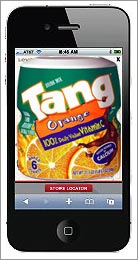 Last week at OMMA Mobile in New York, Mondelez Director of Innovation and Emerging Technology Ed Kaczmarek astonished even this mobile-friendly crowd
with the statement that his company planned to spend 10% of its annual marketing
budget on mobile. The follow-up question from the audience was obvious. Where was he going to spend all that money? That is an awful lot of Cadbury chocolate, Oreo cookies and Tang orange drink -- all
brands under the Mondelez umbrella.
Last week at OMMA Mobile in New York, Mondelez Director of Innovation and Emerging Technology Ed Kaczmarek astonished even this mobile-friendly crowd
with the statement that his company planned to spend 10% of its annual marketing
budget on mobile. The follow-up question from the audience was obvious. Where was he going to spend all that money? That is an awful lot of Cadbury chocolate, Oreo cookies and Tang orange drink -- all
brands under the Mondelez umbrella.
At the time, he talked a lot about video. But apparently, a good deal of that money may also be going across a number of Google mobile assets. The two
companies announced a strategic agreement involving mobile search, display, and Web sites.
advertisement
advertisement
This is Mondelez's first such agreement that is mobile-only. And it will involve a range of services
that will include the building of branded mobile Web sites, mobile analytics, and being able to test mobile beta programs. The program will reach globally across 16 countries in North America and
Europe as well as emerging markets in the Middle East and Asia-Pacific and Eastern Europe. Starcom MediaVest helped broker the deal.
In announcing the deal and reiterating its commitment to
spend 10% of its global marketing budget on mobile activations, Mondelez also asserted its confidence in the performance of mobile. Beth Reilly, head of global digital strategy, said in the company
statement: “As we look at mobile as a pure media platform, we’re seeing engagement rates that are sometimes four times greater than traditional display.” She says that mobile has
made the company reevaluate how it engages consumers across all media as they move towards a purchase. “We're mapping media against the entire consumer journey and re-thinking our media
investment through a mobile lens.” She promises that there will be more deals like this coming.
This is a major vote of confidence in the mobile platform on a number of grounds. It is
not just investing money in mobile. It is investing in the idea that mobile is at the center of a changed game when it comes to activating consumers along their journey toward a purchase. Mondelez is
acting on what a lot of brands are dancing around and talking up: mobile platforms not only create a more complex path to purchase, but they expose and give marketers access to a path that was always
more nuanced than traditional media channels really could handle. Traditional media tied content and commercial experiences to physical situations and put inherent limitations on where and how
marketers could access the consumer decision-making process.
Mobile essentially liberates media from those constraints and so opens up the possibilities for marketing in a staggering set of
ways. Mondelez is not just throwing money at a new platform because it is big. They are investing in a revised understanding of how people make purchase decisions and the platform that is always
there.